Past leaders can teach us a great deal about how we can become leaders today. Biographies, memoirs and documentaries abound which underscore the achievements and abilities of the numerous outstanding leaders who came before us.
The history of the United States in particular is filled with past presidents who are excellent examples of great leaders. Their various qualities and characteristics are often cited as the key to their leadership abilities, and these qualities are often emulated by others.
George Washington:
“To contract new debts is not the way to pay old ones.”
George Washington was more than just an inspiring battlefield commander. His leadership, his vision, and courage united a war-torn country and set the United States on the path to greatness.
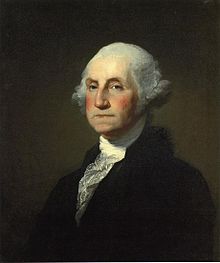
Washington was an effective, inspiring, and visionary leader whose historic contributions to the nation were rooted in his character. Throughout difficult times he remained steadfastly honest and ethical, making him a role model for leaders everywhere. And, since his time, not one president has admitted to chopping down a cherry tree.
Washington was also an entrepreneurial businessman and innovative farmer. For instance, he was America’s leading promoter of the breeding and use of mules, the offspring of a male jackass and a female horse, making him the agricultural Steve Jobs of his day. Bosses who want to nurture and develop new ideas while maintaining a consistent code of ethics should take a long look at how George Washington handled himself.
Abraham Lincoln:
“Always bear in mind that your own resolution to succeed is more important than any other one thing.”
Like with Washington, no list of presidential leaders is complete without Abraham Lincoln. Lincoln presided over the most tumultuous time in American history. The nation that Washington, Jefferson and Adams had shepherded through its infancy was tearing itself apart. The South had seceded, brothers were fighting brothers and thousands of people were enslaved. American soil was soaked in American blood, and Lincoln had to try and weave the nation back together.
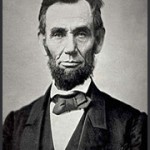
In her book Team of Rivals, historian Doris Kearns Goodwin illuminates Lincoln’s brilliant leadership as he rose from obscurity to the presidency, triumphing over three gifted rivals with greater national reputations.
Great leaders in the mold of Lincoln are open to intelligent perspectives and good ideas — no matter what the source — and are confident enough to reach out to their rivals.
Franklin D. Roosevelt:
“Happiness lies in the joy of achievement and the thrill of creative effort”
In his First Inaugural Address, Franklin D. Roosevelt famously said that the “only thing we have to fear is fear itself,” inspiring a nation that was reeling from the Great Depression. But he also talked about leadership, saying, ” In every dark hour of our national life a leadership of frankness and vigor has met with that understanding and support of the people themselves, which is essential to victory. I am convinced that you will again give that support to leadership in these critical days.”
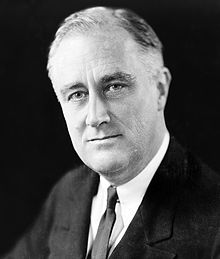
Roosevelt was known for his consummate political skill — his ability to deal with government bureaucracy, navigate party politics and special interests, and still address the needs of the people.
In order to survive the labyrinth of government, or work the corporate system, one must be a master politician. No factor was more important to Roosevelt’s success than his confidence in himself and his unshakable belief in the American people. What is more, he had a remarkable capacity to transmit his cheerful strength to others, to make them believe that if they pulled together, everything would turn out all right. Bosses who can inspire with their own indomitable spirits and an ability to get diverse groups on the same team might be compared to FDR.
Read Franklin D. Roosevelt Quotes
Theodore Roosevelt:
“Believe that you can, and you’re halfway there.”
Something that many leaders and managers can forget in the hustle of demands that comprise their jobs is taking the time to establish an unshakeable self-confidence. Few things can poison your performance quite like self-doubt, and when you’re a manager, you’re self-doubt is far more visible and affects far more people.
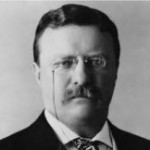
Theodore Roosevelt said it best with the quote above: when you’ve decided to believe in yourself and your abilities as an effective leader and manager, and you’ve knocked out a ton of the work that it takes to actually manage. Remind yourself that you got the job for a reason, but keep in mind that you are responsible for a group of people who depend on you to help them do their jobs better. It’s a lot of responsibility, but believing you can do it is a huge part of juggling all of them beautifully.
Effective managing will likely never get easier, but keeping a few inspirational leadership quotes in the back of your mind for the days when your position really challenges you is an easy and comforting way to stay on track and keep on trucking.
Read Theodore Roosevelt Quotes
John Fitzgerald Kennedy:
“No matter how big the lie, repeat it often enough and the masses will regard it as the truth.”
John F. Kennedy, also referred to as JFK, served as our thirty-fifth from 1961 until his assassination in 1963. JFK is remembered for his deep focus and thoughtfulness, during times of crisis. He avoided a nuclear war with the Soviet Union in the 60s when he refused to bomb missile sites in Cuba, which would have almost certainly led to retaliation by the Soviets.
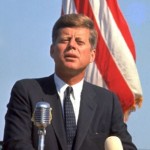
He remained focused on his goal to remove the missiles from Cuba peacefully, and avoided creating additional conflict. He successfully analyzed his options, took the time needed to make the right decision and effectively avoided a nuclear war. These skills served him well not only during the Cuban Missile crisis but throughout his presidency, and are critical skills for every business leader today.
Ronald Reagan:
“A recession is when your neighbor loses his job. A depression is when you lose yours. And recovery is when Jimmy Carter loses his.”
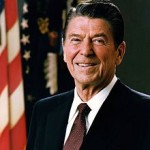
This was one of Reagan’s slogans during his 1980 presidential campaign. Politics aside, it’s pretty funny. But it also points to a greater truth—everyone around us might be in a financial mess, but it doesn’t hit home until it affects us personally.
Read Ronald Reagan Quotes
John Adams:
“Remember, democracy never lasts long. It soon wastes, exhausts, and murders itself. There never was a democracy yet that did not commit suicide”
John Adams has the misfortune of being sandwiched between two of the most brilliant and memorable presidents in United States history. Adams stepped into Washington’s shoes when he took up the presidency, and those were shoes no man could have filled.
Then, when Adams stepped down, the brilliant Renaissance man Thomas Jefferson took up the mantle of “Mr. President.” The leadership lesson Adams teaches, however, is one that too many would-be leaders forget.
Thomas Jefferson:
“Never spend your money before you have it.”
Thomas Jefferson is known for more than just his time as president. He authored the Declaration of Independence and the Virginia Statue for Religious Freedom, which later inspired the Bill of Rights. In addition to his political abilities and his extraordinary talent as a writer, Jefferson has been called “the last Renaissance man” due to his wide range of talents and abilities.

In addition to statecraft and the written word, Jefferson mastered six languages, played the violin and assembled a 10,000 book library. This massive collection of books would later become the foundation for the Library of Congress. Thomas Jefferson was also a creative.
Harry S. Truman:
“Not all readers are leaders, but all leaders are readers.”
Truman took office toward the end of World War II after the death of Franklin D. Roosevelt. Truman took his Oath of Office as the Allied forces closed in on both Berlin and Tokyo. Truman had no prior experience with foreign policy before he was thrust into the role of Commander in Chief and was expected to be one of the Allies’ leaders.
During his first six months as President of the United States, Truman saw the surrender of Germany and had to make one of the most infamous decisions in human history: how to force Japan to surrender.
Dwight Eisenhower:
“The older I get, the more wisdom I find in the ancient rule of taking first things first. A process which often reduces the most complex human problem to a manageable proportion.”
Was Eisenhower talking about the Baby Steps? Probably not. But the truth in that quote can definitely be applied to Dave’s advice on getting out of debt. By attacking your debt in “manageable proportions,” you allow yourself to win small battles that eventually lead to you winning “the war”—in other words, getting out of debt!

